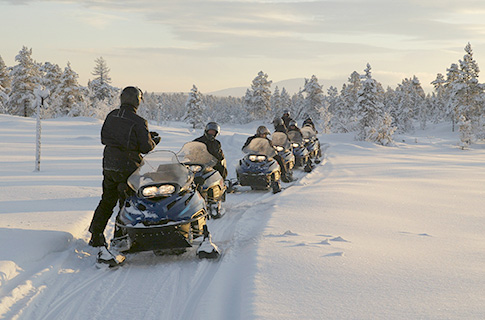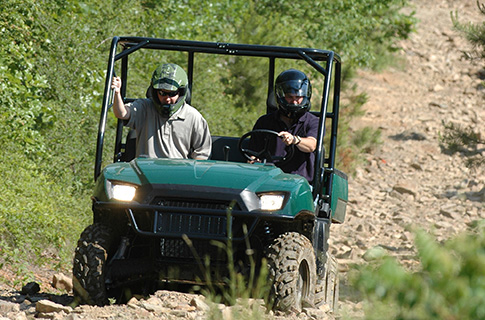Snowmobiles and all-terrain vehicles (ATVs): questions about registration

Before heading out onto the winter white of a snowmobile trail or hopping on your ATV for some off-road action, make sure you have the right documentation to enjoy your favourite pastime legally. Here are the answers to frequently asked questions about registration and insurance.
1- How do I register a snowmobile or ATV?
Like road vehicles, all snowmobiles and ATVs must be registered, even if they are used only on marked trails. If you own one or other of these vehicles, you can go to one of our registration centres to obtain a registration certificate.
Snowmobile and ATV registrations are renewable on a yearly basis: in December for snowmobiles and in March for ATVs.
Note that snowmobile operators who put their vehicle into storage before March 31 are entitled to partial reimbursement of the registration fee, since the vehicle will not be operated year-round.
ATVs can be stored any time of year, since they are all-season vehicles. A reimbursement is possible, and worth it if the vehicle is in storage for more than a month.
In Quebec, only registered vehicles with renewed licence plates can be driven across a public road and on trails. In addition, a valid trail permit is mandatory to drive on trails maintained by off-road vehicle clubs.
2- How much does registration cost?
The cost to register an off-road vehicle varies with the type of vehicle. To find out the exact amount you should expect to pay for your snowmobile or ATV, your best source is the Société de l’assurance automobile du Québec website.
If the vehicle is new, you will need to show your driver’s licence (regular or probationary, regardless of a class), which also entitles you to drive a snowmobile or any other all-terrain vehicle.
3- Can I register a snowmobile or ATV without the required supporting documents?
This may occur if an off-road vehicle is acquired as part of an estate sale or sale of an entire property. In these specific cases, the new owner must have the vehicle registered before being allowed to operate it legally. These situations are dealt with case by case, and you would have to contact the SAAQ before going to a registration centre.
Always keep in mind, though, that you must register any vehicle you own, even an off-road vehicle, and you must do so as soon as you acquire it. This is to avoid a situation where a vehicle has no legal owner.

4- What are the penalties for violations?
For violations of the Highway Safety Code or the Act Respecting Off-Highway Vehicles, offenders risk:
- a fine; and
- demerit points (the same as those applying to drivers of road vehicles).
And, of course, driving a snowmobile or ATV with one’s faculties impaired by alcohol, drugs or medications is illegal. The same zero-tolerance policy is applied as for road vehicles.
In addition, the real impact on the driver’s wallet is seen then the time comes to renew their licence: the cost increases with the number of demerit points.
5- Do I have to get insurance for my snowmobile or ATV?
While the fee to register a road vehicle includes insurance contribution, the same is not true for snowmobiles and ATVs.
Quebec’s Automobile Insurance Act does not provide for compensation for injuries sustained in an accident involving an off-road vehicle, unless it involves a moving automobile or other vehicle being driven on a public road.
If you drive a v snowmobile or ATV, whether on private property or on a trail, you must hold civil liability insurance of at least $1,000,000 to cover property damage or bodily injury to another person caused by your vehicle. If you are a member of a federation, the dues you pay for trail access and maintenance include civil liability insurance.
It’s important to understand, however, that this mandatory insurance doesn’t cover possible material damage to your own vehicle and its accessories. You therefore need additional coverage—which you can purchase from your auto insurance provider, because there are benefits to bundling your auto insurance with your snowmobile or ATV insurance. Note also that civil liability insurance for the minimum amount of $500,000 may not be enough if you go on a snowmobile trip across the U.S. border: in such cases, your insurer may recommend increasing the coverage amount to $1 million or $2 million.
6- Is there a specific course requirement or minimum age requirement to drive a snowmobile or ATV?
Operation of an off-road vehicle such as a snowmobile or ATV by any person under 16 is prohibited. Furthermore, snowmobilers and ATVers aged 16 and 17 must hold a certificate of competence and knowledge.
For snowmobile operators, the certificate is issued by the Fédération des clubs de motoneigistes du Québec after completion of a training course. In the case of ATVs (e.g., quad bike, recreational off-road vehicle or “side-by-side”, trail bike), it is issued by the Fédération québécoise des clubs quads after completion of training.
Regardless of their age, all drivers must comply with certain rules. For example, when crossing a public road, no matter whether it is busy or quiet, they must do so at a designated crossing point and must hold the required driver’s licence.
Furthermore, you must be at least 18 years old if you want to carry a passenger when driving an ATV. You must also be at least 18 to drive a recreational off-road vehicle (ROV or “side-by-side”).
7- How can I protect myself in the event of an injury in an accident on the trails?

As explained above, the SAAQ does not compensate snowmobilers or ATVers for injuries suffered in an accident, other than in exceptional cases. Obviously, the Régie de l’assurance maladie du Québec (RAMQ) will cover the medical costs of your treatment but you may have to pay other expenses, such as transportation by ambulance, physiotherapy, vocational rehabilitation or adaptation of a vehicle or home following a permanent injury requiring the use of a wheelchair or other aid.
If you have group insurance or private health insurance, there may be benefits paid in such cases. If not, you could buy accident insurance, which is specifically designed to cover this kind of situation. It provides financial protection in the event of death or permanent injury caused by an accident, including an off-road mishap.

Benefit from personalized advice
Do you have questions about gas-powered or electric vehicles, driving, or need recommendations to find an Approved Auto Repair Service?